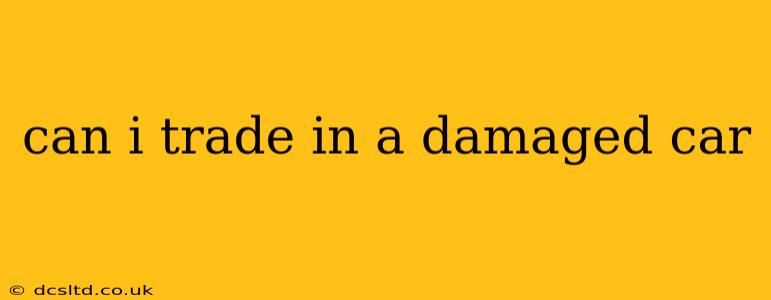Can I Trade in a Damaged Car?
Yes, you can generally trade in a damaged car, but it will significantly impact the value you receive. The process is more complex than trading in a car in perfect condition, and you'll need to be prepared for a lower offer and potentially more negotiation. This article will explore the intricacies of trading in a damaged vehicle, answering common questions and offering advice to maximize your return.
What Constitutes a "Damaged" Car?
The term "damaged" encompasses a broad spectrum of vehicle conditions. This includes:
- Cosmetic Damage: Scratches, dents, and minor paint imperfections. While these affect the car's appearance, they generally don't impact its mechanical functionality.
- Mechanical Damage: Problems with the engine, transmission, brakes, or other vital systems. This significantly reduces the value and may even render the car undrivable.
- Collision Damage: Damage resulting from an accident, including structural damage, airbag deployment, and broken glass. The severity of the damage will determine the impact on the trade-in value.
- Flood Damage: Water damage to the car's electrical systems, interior, and engine can be extremely costly to repair and drastically reduce the car's worth.
How Much Will I Get for a Damaged Car Trade-In?
This depends heavily on the extent and type of damage. Dealers will assess the damage, factoring in repair costs and resale value. Expect a significantly lower offer than the car's pre-damage value. For cosmetic damage, the reduction might be moderate. However, mechanical or collision damage can lead to a drastically lower offer, or even a refusal to accept the trade. Flood damage often results in the lowest possible trade-in value or even a rejection.
What Happens During the Trade-In Process?
The process is similar to trading in an undamaged car, but with crucial differences:
- Disclosure: Be completely upfront about the damage. Failing to disclose damage can lead to legal repercussions and severely damage your credibility.
- Appraisal: The dealer will conduct a thorough appraisal, inspecting both the interior and exterior for damage. They might use a professional appraiser to determine the car's actual cash value (ACV).
- Negotiation: Be prepared to negotiate. The initial offer will likely be low, but you can negotiate to improve the offer.
- Paperwork: Complete the necessary paperwork, just like a standard trade-in. This includes the title transfer.
What if My Car is Undriveable?
If your car is undriveable due to damage, you may need to arrange for its transportation to the dealership. The dealer may or may not be willing to cover towing costs. This is another crucial point to discuss during negotiations.
Can I Still Trade in a Car with a Salvage Title?
Trading in a car with a salvage title is significantly more challenging. Many dealerships won’t accept vehicles with salvage titles due to the high risk and potential repair costs. However, some dealerships specializing in salvage vehicles might consider it. You'll likely receive a very low offer.
What are My Alternatives to Trading in a Damaged Car?
Consider these alternatives:
- Private Sale: You might get a better price selling privately, but it takes more effort and carries risks.
- Repair and Sell: If the repairs are relatively inexpensive, repairing the damage before selling might improve the resale value.
- Junkyard/Scrap Yard: If the damage is extensive and the car is not worth repairing, you can sell it for scrap.
How Can I Maximize My Trade-In Value for a Damaged Car?
- Gather Repair Estimates: Obtaining repair estimates can provide a reference point for negotiations.
- Clean the Car: A clean car presents better, potentially increasing your chances of a better offer.
- Document Everything: Keep records of all repairs, accidents, and any associated documentation.
- Shop Around: Get appraisals from multiple dealerships to compare offers.
By understanding the factors that influence trade-in value and preparing thoroughly, you can navigate the process of trading in a damaged car more effectively. Remember, honesty and transparency are key to a successful outcome.
